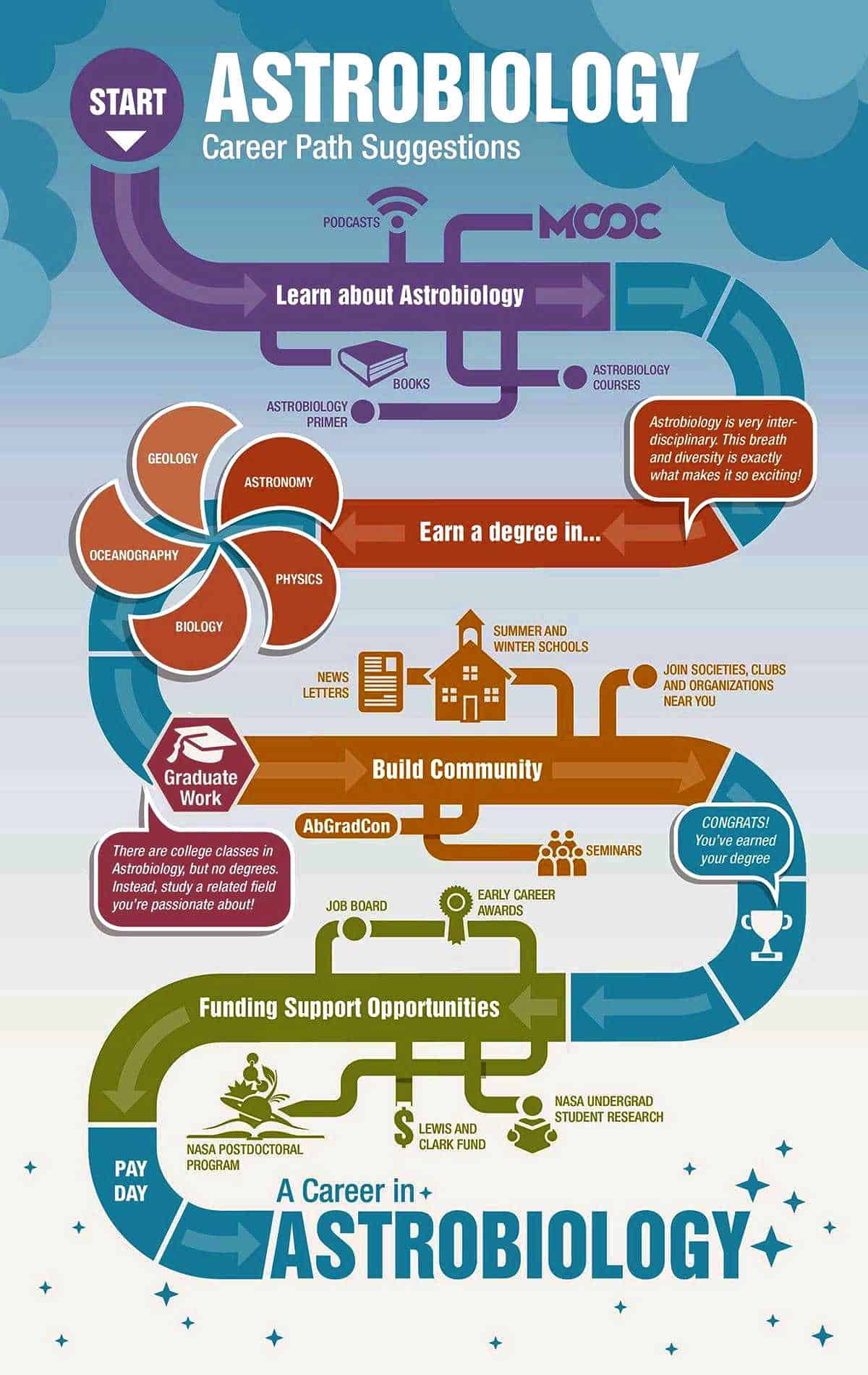Astrobiology Career Opportunities – How to Become An Astrobiologist
Haven’t we all wondered thinking what is life? How did life start? Is there any extraterrestrial life? A field of science that mainly involves answering such questions is known as Astrobiology. It is defined as the study of the origins, evolution, distribution, and future of life in the universe. Astrobiology involves research into the origins, early evolution, and diversity of life on Earth; the search for evidence of prebiotic chemistry or life on Solar System bodies like Mars, Saturn’s moon Titan, and Jupiter’s moon Europa; and the search for habitable environments in our Solar System and on planets around other stars. Biological interest in space research was fueled with the discovery of amino acids in carbonaceous chondrite meteorites and complex organic molecules in interstellar clouds, comets, and interplanetary dust. Hope that life might exist on other planets comes from witnessing the existence of different life forms in extreme environments of Earth, their ability to adapt and survive for long periods in stasis, and then recover.
For a long time, the pursuit of many space agencies around the world has been the search for life outside of planet Earth. India’s journey into
an exciting world of space science was kickstarted since the beginning of interplanetary missions by ISRO in the last 10 years or so, and India has got into the foray of experimenting and sending probes with an aim to unravel the mysteries of life in the universe. An integrated and comprehensive understanding of biological, planetary, and cosmic phenomena is required in this interdisciplinary field of astrobiology, which is relatively new when compared to the long-established fields of biology, astronomy, physics, planetary science, geology, among others.What does An Astrobiologist Do?
Astrobiologists, usually being experts in biology as well as astronomy, spend a lot of time in laboratories researching and studying to find out if life can exist elsewhere apart from the Earth. Their work involves studying various moons and planet to check if life can be supported in the conditions there, they are also involved in analyzing fossils of the earliest life forms trying to find out how they arrived on Earth, testing and recording the lifecycle of bacteria that can survive in harsh conditions, looking for places where the simplest forms of life may exist, and many projects such as searching for radio signals from intelligent life in the Universe.
Career Roles in Astrobiology:
Besides doing research in a lab, there are various other variety of jobs open to astrobiologists such as lecturing at a university; working in the press office providing information to the media about the latest astronomy news; being a science journalist writing for magazines, books, newspapers, or websites about the latest discoveries; developing educational materials such as Astrobiology Graphic Histories if you have artistic skills; work in science policy or in project management or administration (helping space missions get funded and co-ordinating their construction and operation), among others.
How to Become An Astrobiologist?
Specializing in a single scientific discipline is the typical pathway for a student interested in pursuing astrobiology graduate studies. Choose a field that you are really passionate about and that really excites you, this discipline will be the base of knowledge that you will build upon. Candidates with any scientific background can get into astrobiology as it is a very interdisciplinary field. Any STEM (Science, Technology, Engineering, and Mathematics) subjects can be taken up to pursue a career in astrobiology.
Skills Required:
- Analytical skills for being precise during research experiments
- Critical-thinking skills for examining and analyzing research work
- Technical skills for using various equipment required for research
- Math skills for performing complex operations with research experiments’ data
- Flexible for having an unbiased perspective for research
- Persistent for continuing research
- Out-of-the-box Thinker to come up with innovative research ideas
Image Credits: NASA
Educational Requirements:
Entry-level positions require a bachelor’s degree in any related stream. Students can pursue the subject they are most interested in, degrees in biology, chemistry, geology, physics, astronomy, and so on. Master’s or doctoral degrees are required for more advanced positions in the field.
Undergraduate studies can be pursued in any science stream the candidate is interested in and focus on building a foundation in the field of interest. Postgraduate studies can be pursued by looking at research topics of individual scientists involved in astrobiology or related areas. In a similar way, you can also go ahead and pursue Postdoctoral work in your field of interest. The NASA Astrobiology Institute is a good place to look for research projects. There are several special programs, summer programs, scholarships offered in the field of astrobiology by NASA, which can be taken up during their education. You can also take up the various online certification courses available in astrobiology and related areas to boost your knowledge and gain better career opportunities in astrobiology. Additionally, you can start networking and engaging with your astrobiology community to grow in this field.
Some Institutes Offering Degrees in Astrobiology
- NASA Astrobiology Institute
- European Astrobiology Institute
- Florida Institute of Technology
- Pennsylvania State University
- University of Arizona
NASA Astrobiology Institute offers various range of courses and opportunities in astrobiology such as NASA summer programs, scholarships, and special programs, the Astrobiology Primer, the NASA Astrobiology Program, the Astrobiology Graduate Conference (AbGradCon), astrobiology summer schools, the NASA fellowships, and opportunities, and NASA’s job board.
Institutes Offering Astrobiology and Astronomy Courses in India:
- Indian Astrobiology Research Foundation (IARF), Mumbai
- Amity Centre of Excellence in Astrobiology, Amity University
- M. P. Birla Institute of Fundamental Research, Bangalore
- Indian Institute of Science, Bangalore
- Ramana Research Institute, Bangalore
- Tata Institute of Fundamental Research, Mumbai
- Aryabhatta Research Institute of Observational Sciences, Nainital
- Indian Institute of Astrophysics, Bangalore
- Indian Institute of Space Science and Technology, Thiruvananthapuram
- Savitribai Phule Pune University, Pune
You will be able to find many different ways of having a career in this relatively new and vast field of astrobiology if you are really interested in the exciting world of astrobiology and space exploration. As Albert Einstein once said, “the universe is stranger than we can imagine“, there is definitely a lot more to explore beyond our home planet. If you are someone fascinated by the way the world works are intrigued to dig deep and find more answers about the existence of life on Earth and the universe, the field of astrobiology is your game!
Keywords: Astrobiology Career Opportunities, How to Become An Astrobiologist, Astrobiology Career Opportunities







































